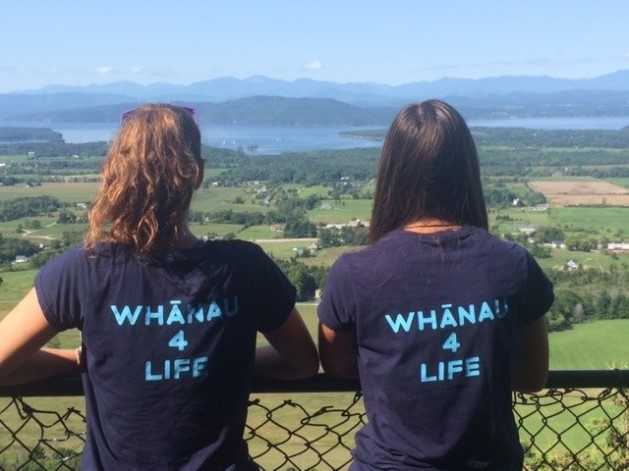13 September 2016 at 9:00 am
Whānau 4 Life: New Zealand to Vermont
Alanna Dick, ENZ’s Field Director – North America, joined the North American Whānau Council in Burlington for a weekend of kai, waiata, haka and poi.

The pedestrians in Burlington, Vermont USA had no idea they would stumble upon haka and poi performances as they strolled up Church Street on a recent Saturday evening.
The North American Whānau Council held its second annual event which included a BBQ, a hike up Mt. Philo and a dinner with waiata (songs) before taking its performance to the streets of Burlington. There was also an emotional ceremony, where the co-presidency was passed to two successors.
The North American Whānau Council is an organisation that sustains the relationship between North Americans who have been positively affected by Māori culture during their study abroad experience at Auckland University of Technology. The relationships are re-established each year through the North American Whānau Council Weekend, which continues the cultural exchange between alumni and their Māori whānau, or family.

Teaching poi to the next generation of AUT Whānau at Mt. Philo
The initial concept of the Whānau Council was started by AUT alumni in Denmark, and soon expanded to other countries in the region to create the European Whānau Council. Members are AUT alumni who took classes offered by the Faculty of Māori and Indigenous Development, and participated in the Noho Marae, a three-day event held at Ngā Wai o Horotiu Marae where AUT introduces international students to Māori culture, customs and the concept of ‘whānau’ or family.
Last year, two students from the University of Vermont (UVM) started the North American Whānau Council. AUT partners with two institutions in the Burlington area, which is one of the reasons why AUT whānau is so strong in Vermont.
The University of Vermont and AUT also have a partnership between their education departments. UVM students enrolled at AUT participate in a teaching internship at a primary school in Auckland, gaining a new perspective from the international setting. There have been more than 40 students in the programme over the last six years, with this year containing the largest cohort so far.
Dr Ellen Baker, head of UVM’s education department, says the international exchange has many benefits.
“Students can continue their professional trajectory, which is enriched by their experience in New Zealand. AUT has welcomed them through the orientation and the Noho Marae experience – students immediately feel a part of the community.”
Jason King, Senior Lecturer of the Faculty of Maori & Indigenous Development, AUT with the North American Whānau Council on top of Mt. Philo
Dr. George Burrill, Trustee to Champlain College and the Honorary Consul from New Zealand to Vermont, encouraged Champlain College to offer scholarships for a reciprocal exchange between Champlain and AUT students. At a recent awards luncheon, Connor, a scholarship student from Champlain College, told how despite his busy academic schedule at AUT he also coached a boys’ basketball team, and was also able to find time to explore New Zealand where he “geeked out for a few days and was a hobbit in Middle Earth,” exploring all the way down to Queenstown. Connor ended his speech with gratitude for the scholarship opportunity.
“I thank you once, I thank you twice, I thank you a thousand times for helping me in my journey. This opportunity has truly changed my life and the memories I made will not be forgotten.”
Thank you to the North American Whānau Council and the AUT staff for allowing me to join the Whānau in Burlington for the weekend.
Key takeaways
• Alumni are very eager to share their stories and participate in alumni events.
“I never get sick of talking about New Zealand.” – Monica
• Before students leave New Zealand, ask them how they will stay connected. The education graduates at UVM are developing a unit on Māori history and culture to teach in their classrooms.
“Most incredible semester I’ve ever had.” – Megan
• Connect your alumni with your contact at their international office so they can talk to prospective students during orientation, info sessions or a study abroad fairs.
Students are the driving force of alumni events abroad. Even when US students only come to New Zealand for one semester, their connection to Māori culture and the people of New Zealand lasts a lifetime thanks to the welcoming and positive learning culture.

